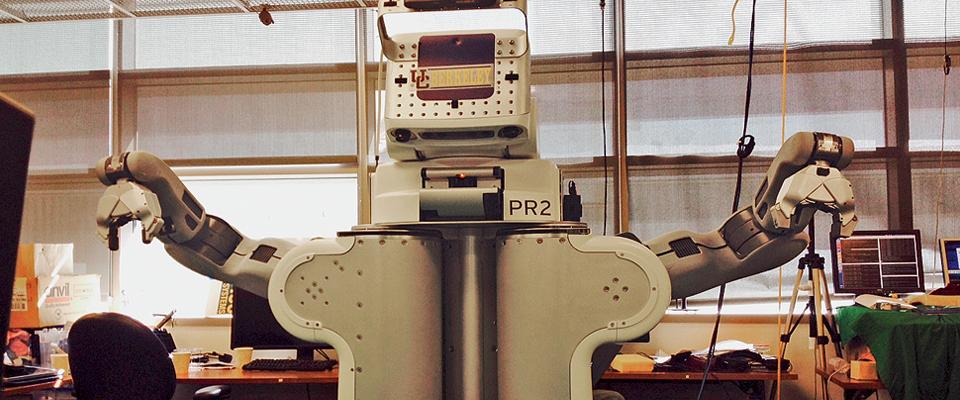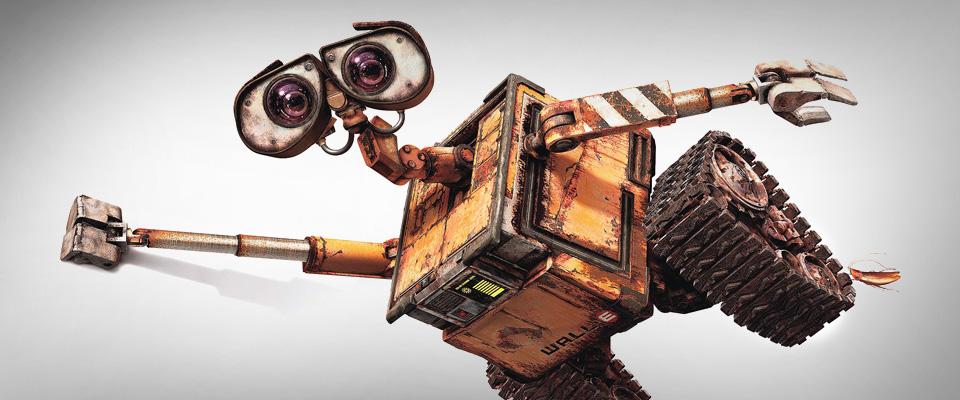The two robots spin and lurch, their little electric motors whirring against each other as a bevy of kids look on, their eyes bulging and their shoulders scrunched almost up to their ears in rapt attention. A girl of about 12 with long black hair scratches her chin, smiling nervously—a smile that twists into a grimace as her robot battles too near the edge of the circular table. She talks to her robot, goads it on, giggles. When that fails, she resorts to body English, rapping her right hand against her hip three times. And then she doubles over in screams as her robot topples off the edge. Her opponent stands with her arms raised in victory, high-fiving her teammates amid whoops of celebration.
The scene is what you might expect if you crossed robotics with sumo wrestling. In fact, that’s exactly what it is: the Sumo Robot Competition at the 7th Annual Cal Poly Pomona Robot Rally.
These are the moments robot kit creator Lavanya Jawaharlal lives for, moments when young people get thrilled by science and engineering via their robotic creations. It is a key reason why Lavanya and her sister created bargain robots to begin with—to better reach kids who otherwise might never have discovered their aptitude for science, technology, engineering, and math. Kids whose families and schools lacked the money to buy the more expensive robot kits on the market.
“The parents see their kids screaming and yelling and having so much fun, and you realize there has to be something important going on…and they are learning,” says Jawaharlal.
Although still a Berkeley undergrad, she founded the Pomona-based company STEM Center USA three years ago with her sister. At first they provided a six-week robotics classroom course to underprivileged kids for about $120. But when the robots already on the market in the $200 to $400 range seemed too pricey, the sisters decided to produce a cheaper alternative on their own.
Launching a crowdfunding campaign, they raised enough money to produce more than 1,000 of their “Pi-Bot” robots, which are priced at just $75. They are now being shipped to 45 countries.
Their efforts attracted the attention of the office of the Vice President—after all, the Obama administration has publicly called, by 2018, for a million more U.S. high school graduates to be “STEM-ready”— referring to science, technology, engineering and math. Jawaharlal and her sister Melissa were among 100 guests invited to meet Vice President Joe Biden and his wife, who praised them for their work “to inspire the next generation of STEM leaders.”
Among the 88,176 engineering-degree graduates in 2012, 19 percent were female, 4 percent African-American, and 9 percent Hispanic, according to the American Society of Engineering Education. Jawaharlal wants to boost those numbers.
“The demographics just don’t allow them to have the opportunity to be exposed to technology at a young age. It’s a privilege thing,” she says. “There is of course the girls and boys issue, that’s already one stereotype. But a lot of people tend to overlook the fact that the public school system doesn’t have enough money to be offering courses like that. And then you have families with low income and they can’t buy a robot kit.”
So the sisters started building their own prototype. Their creation, the programmable Pi-Bot kit, includes wheels, a chassis, a gearbox, dc motors, wiring, ultrasonic and light sensors, and all the fasteners and wires needed for assembly, as well as a modular platform for interchanging sensors. “Kids get to build the gearbox from scratch, so they really get to see the mechanical side of things,” says Lavanya Jawaharlal.
To get to their $75 target price, they needed to produce a thousand units. That would take money.
While Jawaharlal shouldered 22 credits as a mechanical engineering major, she and her sister began a crowdfunding campaign last January with the goal of raising $70,000. She reached out to family, friends and Cal alumni, and asked her UC Berkeley professors to mention the project in their newsletters. They made a video of a working prototype on their Kickstarter page. Melissa, who recently earned a degree in mechanical engineering from the University of Southern California, worked the Los Angeles area. They only passed their goal in the last 12 days—actually shooting beyond it to garner $113,000 from 1,100 backers—and exceeding the typical campaign, which tends to generate less than a tenth that amount.
“It was really nerve-wracking,” Jawaharlal recalls. “There was a point that we didn’t think we were going to make it.”
She traces her initial Eureka moment of inspiration to her junior year in high school, when her parents, both Ph.D.s in mechanical engineering, pushed her to take a robotics class. “I was on the robotics team, I was one girl with seventeen guys…But once I was on the team, I realized that I really enjoyed it,” she says. “The robot was six feet tall, it had an arm that would throw a basketball.” One day they demonstrated their robot to an elementary school, and that’s when she saw that tangle of fascination and glee on all those young faces.
Today, without having yet earned a college degree, she has spent the past semester meeting the VP, taking 22 credits, completing her successful crowdfunding campaign and running a company. And even that wasn’t enough for Jawaharlal—she managed to find time to campaign to be a senator of the Associated Students of the University of California. She won.
Update: In October of 2015, the Jawaharlal sisters appeared seeking high-roller investors for on the ABC’s show “Shark Tank ” Lori Greiner, the so-called “Queen of QVC,” struck a deal, investing $200,000 for a 20 percent stake in their company. Lavanya, now a UC Berkeley senior, and Melissa, a graduate of USC, say they want to franchise their STEM center locations across the country as well as promote their product line.




















